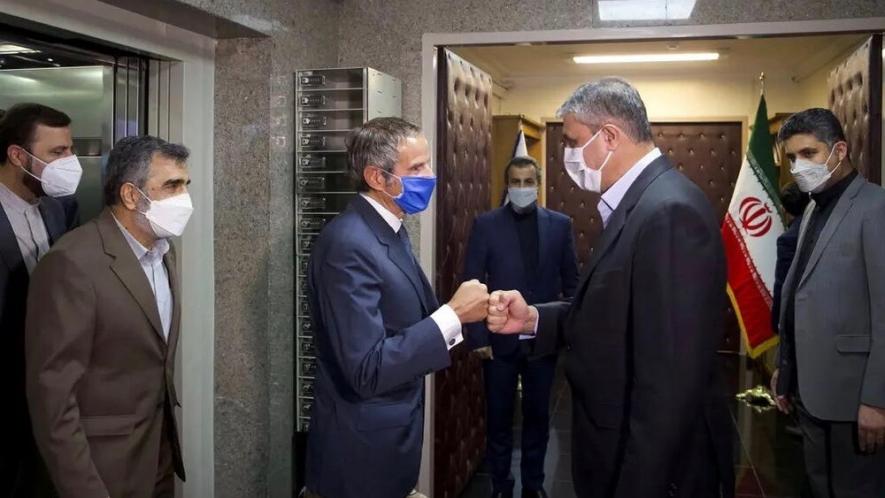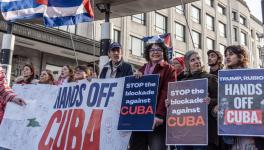Iran Nuclear Deal Prospects Dim Again

(Photo: Tehran Times)
An early revival of the Iran nuclear deal, or the Joint Comprehensive Plan of Action (JCPOA), once again looks unlikely. The delay this time has less to do with the clauses in the draft agreement submitted by EU Foreign Policy chief Josep Borrell last month. Instead, according to Iran, the delay is due to a “political move” by the International Atomic Energy Agency (IAEA), the UN nuclear agency, to “fuel a hollow media campaign” to malign the its nuclear program,
Iran has demanded the termination of an investigation into untraced uranium found at previously undeclared locations as alleged by the IAEA.
The US and its allies in the IAEA’s board of governors are not willing to comply with Iran’s demand, despite the latter making it clear that the nuclear deal will not be implemented without the termination of the investigation. The US administration of President Joe Biden has its own reasons to delay the deal at least for now, noted a Times of Israel report, and the Iranian objection gives them a perfect excuse.
This will be the third time in the last few months when negotiations in Vienna between Iran, the US, and other signatories of the JCPOA raised hopes for the deal’s revival but were ultimately were in vain.
The US unilaterally withdrew from the deal under Donald Trump’s presidency in 2018 and has imposed various rounds of economic and political sanctions on Iran.
IAEA’s investigation is “politically motivated”
The IAEA, in its latest safeguards report released on September 7, recommended that its board of governors reject the Iranian demand, claiming that Iran is violating both the Non-Proliferation Treaty (NPT) and its comprehensive safeguards agreement by not cooperating with its probes. The report concludes that the IAEA is in “no position to provide assurance that Iran’s nuclear program is exclusively peaceful.”
The issue pertains to the IAEA finding traces of uranium at different sites in Iran in 2019-20. The IAEA claims that traces of uranium were found at previously undeclared locations and the material has been untraceable since then. The agency blames Iran for not providing “credible explanations” about its whereabouts.
IAEA Director General Rafael Grossi has also alleged that Iran has not engaged him in some “outstanding safeguards issues.”
Iran on the other hand claims that it has already provided all the necessary answers to the IAEA in March. The insistence on continuing the IAEA probe is thus “politically motivated,” Iran claims.
The head of the Atomic Energy Organization of Iran (AEOI) described the IAEA’s claims as a “repetition of the previous baseless issues with political purposes.” He also accused the Western media of using the IAEA’s conclusions to deliberately lead a “hollow media campaign aimed at insinuating that the country’s nuclear program is not peaceful,” Press Tv reported.
“They should not expect Iran to be open to inspections beyond the safeguards agreement when they do not fulfill their obligations and while their oppressive sanctions against the Iranian nation continue,” said AEOI spokesperson Behrouz Kamalvandi.
Professor Seyed Mohammad Marandi, who has been a part of the Iranian delegation at the Vienna talks, reiterated the Iranian claims during his interview with Richard Medhurst recently. He said that the probe is related to issues which are almost two decades old, and can be used as a pretext to derail the deal in future. The probe is loosely based on US claims that Iran ran an organized nuclear weapons program until 2003. Marandi emphasized Iranian President Ebrahim Raisi’s allegations that the IAEA board of governors is a political body and its allegations against Iran are politically motivated and done under pressure from Israel.
Elections in the US and Israel
The IAEA claims that the amount of 60% and above enriched uranium in Iran has now grown enough for a nuclear bomb. The total amount of enriched uranium stockpile in Iran has reached close to four tonnes as against the prescribed limit of 202 kg under the JCPOA. Iran started enriching uranium at higher levels than allowed under the JCPOA following the sanctions imposed by the US.
Iran has asserted that it will continue enriching uranium at a much higher pace until the US agrees to ask the IAEA to close the investigation, and the deal is implemented with enough guarantees against future withdrawals.
According to the Times of Israel report mentioned above, a close understanding is emerging between the Biden administration and Yair Lapid’s caretaker government in Israel to delay the finalization of the deal.
Israel has always opposed the deal, fearing that increased resources for Iran will be used to fund ‘terrorist’ groups such as Hezbollah, Houthis, and others in the region.
Lapid’s caretaker administration has been trying to convince the Biden administration to abandon the deal completely. Any delay in the context of Iranian objections to the IAEA investigation is welcome for Lapid at a time when he is seeking reelection in November.
The Biden administration also does not want to go ahead with the deal before the crucial midterm elections in November and avoid any possible backlash from pro-Israel lobbies and constituencies skeptical of Iran.
The US allies in Europe know its reluctance to resume the deal very well. Therefore, Borrell’s expression of hopelessness and his attempts to blame Iranians for the derailment of the ‘full proof draft proposals’ submitted last month does not sound convincing.
Revival of the deal now would have provided the EU some leverage to deal with the uncertain energy situation before the coming winter, particularly as the Russians have recently stopped the gas supply through Nord Stream 1 pipeline completely and have threatened to shut all supplies if the G7 presses ahead with a proposed price cap on its oil. The absence of the EU asserting its own interests vis-a-vis the US over its tactics on the nuclear deal once again proves the bloc’s complete subservience to the US.
Get the latest reports & analysis with people's perspective on Protests, movements & deep analytical videos, discussions of the current affairs in your Telegram app. Subscribe to NewsClick's Telegram channel & get Real-Time updates on stories, as they get published on our website.























